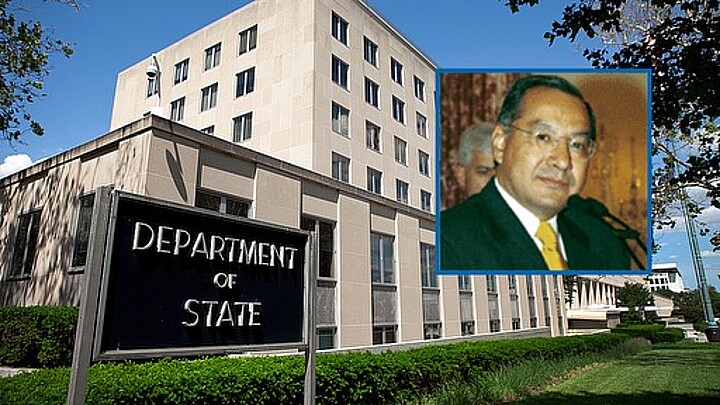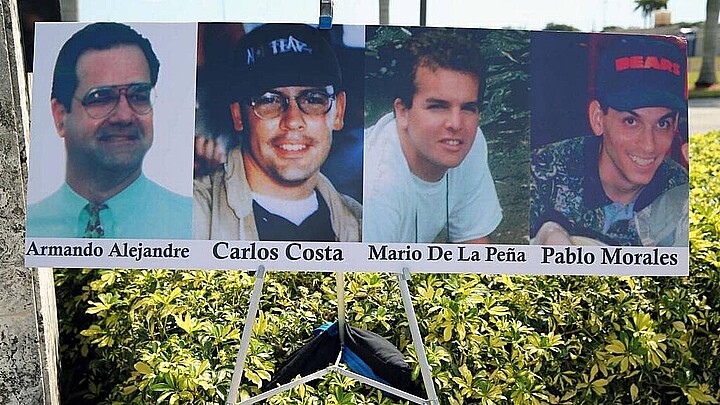Crime
As the U.S. opens doors to investment in Cuban Mipymes, Raul Castro's granddaughter swiftly launch her own
Mipyme Gaia SRL, adds its name to the list of registered Mipymes in Cuba that are owned by members of the Communist Party or tied to the Castro family

October 13, 2023 2:09pm
Updated: November 12, 2023 12:14pm
The Biden administration had plans to introduce new regulatory measures last month, aiming to increase U.S. financial support for small private businesses in Cuba. Among the most controversial aspects of these regulations was the provision permitting Cuban entrepreneurs to open bank accounts in the United States.
These actions were seen as a response to Havana's 2021 laws allowing Cubans to establish small businesses, resulting in over 8,000 official registrations.
However, for over a year, reports have emerged about numerous small businesses linked to high-ranking members of Cuba's communist party, intelligence officers, relatives of Cuban Generals, and even the Committee of Defense of the Revolution (CDR), led by convicted spy Gerardo Hernandez. The CDR comprises a network of neighborhood committees across Cuba, initially created for reporting on dissidents, organizing repudiation acts, and monitoring any form of "counter-revolutionary" activity.
Within the framework of new Cuban regulations for micro, small, and medium-sized enterprises (also known as MSMEs or “Mipymes”), Lisa Titolo Castro, one of Mariela Castro Espín's daughters, opened a store for marketing agricultural products and their derivatives in late September. The establishment, located in the Vedado neighborhood of Havana, adds its name to the list of registered Mipymes in Cuba with connections to Castro family members, or are controlled by individuals closely associated with Cuba’s military oligarchy.
In its latest investigation, ADN uncovered documents from the Cuban Office of Industrial Property, which reveal that another Mipyme, GAIA SRL, was registered over a year ago, and is controlled by Frank Camilo Yanes Maures, a Cuban businessman who sources say runs the business with Lisa Titolo Castro, the granddaughter of General Raúl Castro.
Titolo Castro's name is omitted from the Ministry of Justice (MINJUS) publication and other public records reviewed by ADN.
While her mother, Mariela Castro Espín, and her grandfather, Raúl Modesto Castro Ruz, remained sanctioned by OFAC, Titolo Castro has maintained an e-commerce website since July 2023 where dairy and hygiene products, meats, vegetables, and even beer from the American company MillerCoors are sold.
An ADN investigation confirmed that recording is prohibited inside the family business’ headquarters, which is located at 1st and F in Vedado.
Lisa Titolo Castro is not the sole grandchild of Raul Castro engaged in the family enterprise. Rachel Pérez Hierro, who is in a relationship with Fidel Ernesto Castro Calis, one of Raul Castro's grandsons, is also involved in the business, according to social media posts examined by ADN.
Fidel Ernesto Castro Calis is the son of Alejandro Castro Espín and Marietta Calis Lauzurica.

Currently, GAIA charges its customers through the Tropipay international payment gateway, owned by Nucleo Technology Investments S.L., a company registered in Spain.
According to international law attorney Jason Poblete, who also serves as President of the Global Liberty Alliance in Washington, "from a corporate compliance standpoint, these are high-risk transactions, especially when they involve the sons and daughters of known human rights violators and criminals linked to state-owned enterprises and members of the Communist Party."
Poblete further added that Mipymes are a legal fiction created to evade U.S. sanctions and not a genuine private sector entity. “It's a clever sanctions evasion scheme," he asserted.
Lisa Titolo Castro, whose mother is Mariela Castro, is also the daughter of Italian businessman Paolo Titolo, who heads AMORIM Negocios Internacionales S.A., the Cuban company representing the Portugal based Amorim Group.
The group’s owners have been recognized by Forbes as the richest in Portugal, and also identified by several news outlets as subjects involved in financial corruption scandals.
One of the scandals reportedly involves the billionaire friend of the Castros, Isabel dos Santos, who is also the daughter of the former Angolan president, José Eduardo dos Santos, a self-described female business success story.
However, a 2020 investigation known as Luanda Leaks, conducted by the International Consortium of Investigative Journalists and supported by 36 media outlets, revealed that her fortune was built through the acquisition of public resources in her country, largely facilitated by governmental decrees signed by her father and public funds.

General Raúl Castro’s granddaughter (Titolo Castro), who holds a degree in Industrial Engineering, started her Mipyme as a Local Development Project (PDL), according to Opciones magazine.
Such projects were approved a decade ago and funded by a Swiss sponsored international cooperation effort aimed at decentralizing the Cuban economy. However, in practice, such "incentives" are granted to Cuban regime "government-interest projects" and are managed at the municipal and provincial levels, according to reports published by the communist government.
According to admissions made in the Cuban state press by Mildrey Granadillo de la Torre, the Deputy Minister of Economy and Planning of Cuba, subsidies for their implementation also come from the state budget and territorial contributions.

The address registered for Lisa Titolo Castro appears to belong to a restricted area but does not match the extension of 5th A Street, so it could not be located. However, ADN was able to locate the address of Frank Camilo Yanes Maures in Siboney, a neighborhood known for being the residence of several diplomats and high-ranking members of the Communist Party.
When we arrived at the location, we encountered a setting surrounded by walls and an interior guard post that was not visible from the street, also under surveillance by security cameras.

How do Local Development Projects (PDL) relate to Mipymes?
For years, Cuban Local Development Projects (PDL) received millions from Swiss international cooperation, but that support will expire in 2024.
Consequently, the model has become a government program in Cuba, where it has continued to develop within the framework of the Articulated Platform for Integral Territorial Development (PADIT), with the support of the regime’s Ministry of Economy and United Nations Development Program (UNDP), among others, according to Markus Glatz, Deputy Head of Mission and Cooperation Chief at the Swiss Agency for Development and Cooperation in Cuba.
Las PDL poseen un tratamiento preferencial, ya que pagan menos impuestos sobre la ventas y las utilidades que las cooperativas no agropecuarias y mipymes. Además, no pagan impuestos aduaneros por la importación de maquinarias y tecnología para procesos inversionistas.
Local Development Projects (PDL) receive preferential treatment from the Cuban government, paying lower taxes on sales and profits compared to non-agricultural cooperatives and Mipymes. Additionally, they are exempt from customs duties on the importation of machinery and technology for investment processes.
Profits from Local Development Projects (PDL) are divided among municipal governments as follows: 50% goes into a reserve fund, and the other portion is distributed between the municipal government and the project owners, according to the percentages agreed upon in the distribution process.
As shown in the graph, these local development initiatives have been implemented since 1998.

Micro, small, and medium-sized enterprises (Mipymes) and non-agricultural cooperatives, which are emerging in the Cuban economic environment, can be part of a Local Development Project (PDL).
According to Decree 33, the approval of these projects falls under the jurisdiction of the Municipal Administration Councils or Provincial Governments. Additionally, the communist regime plans the financing of these projects based on the available sources of funding within the Cuban state system.
In 2022 Mariela Castro's daughter was featured as an exhibitor at the Local Development Fair. and event, supported by the Swiss International Cooperation Fund. There, she discussed the success of her Local Development Project, which also functions as an Mipyme. She was accompanied by other local development projects and more than 100 state-owned enterprises.
While one of the goals set by the Swiss for these Local Development Projects was to expand "local access to healthy food" and increase access to adequate nutrition for Cuba’s poorest and most disadvantaged social strata, promotional ads and prices unaffordable to most Cubans suggest that Mariela Castro's store is targeting customers outside the island.
For example, a small bag of powdered milk is sold for 2500.00 CUP, exceeding the Cuban minimum wage of 2,100 pesos. In another example, 200 grams of La Fortuna butter can cost up to 650.00 CUP, and a 1.35 kg bag of chicken reaches 4,305.00 CUP.
The store already offers meat products under its own brand, such as chicken breasts, ground meat, and chorizo vela, among others, all sold at prices that are unaffordable for ordinary working Cubans who solely depend on their state salary without remittances from family members living abroad.
In one of her promotional ads aimed at pulling the heartstrings of overseas family members, , Titolo Castro as those who don’t want their on-island relatives to starve to demonstrate "how present you are for your loved ones" in Cuba by "surprising them with a bag of fresh products." This includes otherwise unaffordable products like goat milk she sells in her establishment or other agricultural products offered under her brand. This can be seen in one of the advertisements running on the Facebook and Instagram platforms under the hashtag #familiacubana.

According to Orlando Gutiérrez-Boronat, the Secretary of the Assembly of the Resistance and leader of the Cuban exile community, "Mipymes are the piñata of the ruling oligarchy in Cuba." He also highlights the "cynicism of those who have contributed to dividing and fragmenting the Cuban nation and families now taking advantage of it for profit."









